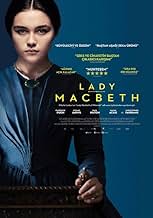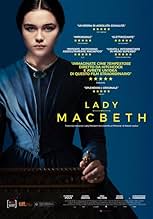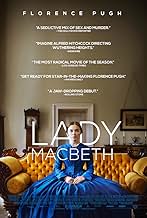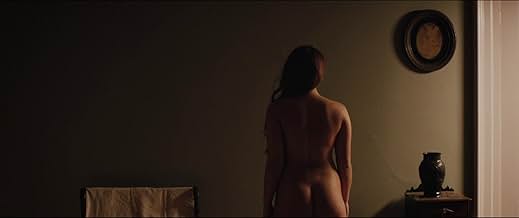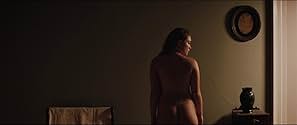Na Inglaterra rural do século XIX, uma jovem noiva que foi vendida para o casamento descobre um desejo incontrolável dentro de si mesma quando embarca em uma aventura com um trabalhador da p... Ler tudoNa Inglaterra rural do século XIX, uma jovem noiva que foi vendida para o casamento descobre um desejo incontrolável dentro de si mesma quando embarca em uma aventura com um trabalhador da propriedade do marido.Na Inglaterra rural do século XIX, uma jovem noiva que foi vendida para o casamento descobre um desejo incontrolável dentro de si mesma quando embarca em uma aventura com um trabalhador da propriedade do marido.
- Direção
- Roteiristas
- Artistas
- Indicado para 2 prêmios BAFTA
- 24 vitórias e 58 indicações no total
Kema Sikazwe
- Farmhand
- (as Kema Slkazwe)
- Direção
- Roteiristas
- Elenco e equipe completos
- Produção, bilheteria e muito mais no IMDbPro
Avaliações em destaque
If I were the producer of this film, I'd have chosen a different title. I'm sure lots of moviegoers are going to be misled: this film has nothing to do with Shakespeare. It's an adaptation of a novel by the Russian author Nikolai Leskov, set in early 19th century England.
The film seems to be a pre-feminism manifesto for women's rights. It shows Katherine Lester, the submissive wife of a wealthy but abusive landowner, living in a secluded manor in the British countryside. During a prolonged absence of her husband, she rediscovers her freedom and starts an affair with one of the stable boys. Not willing to give up her newly acquired status, she starts a series of increasingly extreme actions.
The interesting thing is how Katherine evolves from victim to culprit. She seems to have learned from her husband how to use and misuse power. The lack of social conscience of which she at first is a victim, becomes a driving force for her own behaviour. Her selfishness and lack of morality is so extreme that, in the end, she betrays innocent servants. The viewer has to shift his allegiances: at first, it's impossible not to sympathize with Katherine, enjoying a free life without her heartless husband. But halfway through the film, it becomes clear that Katherine is just as heartless, as soon as she is in power.
The story is filmed in a very effective, sober style with beautiful cinematography. The lack of any music is remarkable: some elongated scenes are striking because of the silence. The oppressive atmosphere in the manor is emphasized by the camera work. The camera repeatedly shows scenes from exactly the same viewpoint. Four or five times, we see the servant Anna entering Katherine's bedroom in exactly the same way.
As much as 'Lady Macbeth' is about gender, it is also about class. It is striking that Katherine, who as a woman is considered a lower form of human life by men, herself considers the servants to be a lower form of human life. She shamelessly uses them for her own purposes and enjoyment, but doesn't care at all about their fate afterwards.
'Lady Macbeth' is a beautiful film, about issues that even nowadays are worth thinking about. But I would have named it 'Lust and loneliness' - after all, it's set in the same period as the Jane Austen novels.
The film seems to be a pre-feminism manifesto for women's rights. It shows Katherine Lester, the submissive wife of a wealthy but abusive landowner, living in a secluded manor in the British countryside. During a prolonged absence of her husband, she rediscovers her freedom and starts an affair with one of the stable boys. Not willing to give up her newly acquired status, she starts a series of increasingly extreme actions.
The interesting thing is how Katherine evolves from victim to culprit. She seems to have learned from her husband how to use and misuse power. The lack of social conscience of which she at first is a victim, becomes a driving force for her own behaviour. Her selfishness and lack of morality is so extreme that, in the end, she betrays innocent servants. The viewer has to shift his allegiances: at first, it's impossible not to sympathize with Katherine, enjoying a free life without her heartless husband. But halfway through the film, it becomes clear that Katherine is just as heartless, as soon as she is in power.
The story is filmed in a very effective, sober style with beautiful cinematography. The lack of any music is remarkable: some elongated scenes are striking because of the silence. The oppressive atmosphere in the manor is emphasized by the camera work. The camera repeatedly shows scenes from exactly the same viewpoint. Four or five times, we see the servant Anna entering Katherine's bedroom in exactly the same way.
As much as 'Lady Macbeth' is about gender, it is also about class. It is striking that Katherine, who as a woman is considered a lower form of human life by men, herself considers the servants to be a lower form of human life. She shamelessly uses them for her own purposes and enjoyment, but doesn't care at all about their fate afterwards.
'Lady Macbeth' is a beautiful film, about issues that even nowadays are worth thinking about. But I would have named it 'Lust and loneliness' - after all, it's set in the same period as the Jane Austen novels.
I was enthralled by this movie from start to finish. The cinematography and sound were excellent. The complete absence of a music soundtrack except for two notable atmospheric crescendos added to the overall oppressiveness of the story and the location. All of the performances were excellent and the lead was outstanding IMO. The story was in many ways familiar - being evocative of Bronte and Hardy - with its portrayal of Victorian country gentry and the brutality and sense of entitlement that sometimes occurred between the classes but the way the story unfolded frequently surprised me by not following through in the way one might have expected it to. I too would recommend a cinema viewing in order to get the full effect of the landscape and the oppressive silence of the house.
The story starts with a marriage. When the wedding is over, we all expect a romance to accure. Though all we observe is a loveless husband who's going to enslave his woman as a figure in a cage. The powerless lady who had tried to be a devoted compliant wife by obedience, receives no reward in return. Untill this part you've already made your side. You excessively sympathize with the oppressed lady.
But soon after, everything changes. In the absence of her husband, she finds her power and freedom to rule the house. The woman who's been inadequatly satisfied in love and passion, makes an affair with one of his stable workers. The taste of freedom to rule makes her insane to do anything to maintain the condition, even if it means she has to murder someone, has to enslave others or has to sacrifice her love.
The movie indicates how feasible it is for an innocent hunt to be the predator hunter, if they find the moment. The performances of Florence Pugh, Naomi Ackie and Cosmo Jarvis are mesmerizing. Although the script, to put it bluntly, is not perfect, I liked it. All in all, it absolutely worth watching and I recommend you to do so.
But soon after, everything changes. In the absence of her husband, she finds her power and freedom to rule the house. The woman who's been inadequatly satisfied in love and passion, makes an affair with one of his stable workers. The taste of freedom to rule makes her insane to do anything to maintain the condition, even if it means she has to murder someone, has to enslave others or has to sacrifice her love.
The movie indicates how feasible it is for an innocent hunt to be the predator hunter, if they find the moment. The performances of Florence Pugh, Naomi Ackie and Cosmo Jarvis are mesmerizing. Although the script, to put it bluntly, is not perfect, I liked it. All in all, it absolutely worth watching and I recommend you to do so.
Looking at the title, you might think director William Oldroyd's Lady Macbeth is about revenge, lust, murder, and boredom, and you would be right on all counts. Katherine (Florence Pugh), a 19th century teen bride of an arranged marriage to a middle-aged drunk, can't get no satisfaction. Her husband is impotent for starters, and the estate is so forbidding murder would seem to be a required pastime.
Yet, sex is the prime mover here, where she discovers randy groomsman Sebastian (Cosmo Jarvis), and takes him to bed in the long absence of her hubby. Meek black Anna (Naomi Ackie), Katherine's servant, observes the shenanigans, much as we do, unable to change what she sees will be an outcome unpleasant to the core. To the end Anna is faithful to Katherine, a slave to a mistress who is herself a slave to men and convention.
Several archetypal themes arise in this somber, artfully-photographed drama. For instance, one that emphasizes the wages of sin is prominent; another about the subjugated rising against the oppressor; and another about the danger of socially imprisoning smart women in a paternalistic society. A leitmotif also surfaces about the dangers of debilitating class distinctions, which are never a good thing in the long haul.
Ari Wegner's cinematography is portrait-like if considering only the recurring shot of Katherine sitting on her Victorian couch in a consuming dress that seems to deteriorate with each similar shot. Underneath the dress is the corset, so long a symbol of the era's tight hold on women.
Remembering Amma Asante's Belle, I'm pleased to see another art- film treatment of fraught race relations in merry ol' England. That none of this will ever stop is promised in the spawn of the miscreants, children of evil destined to repeat their parents' sins.
Lady Macbeth is an interesting minimalist story of a smothered young woman, whose intensity will lay waste to the social fabric of the estate. In fact, much of the proceedings are Shakespearean with their emphasis on man's weakness in his dominance, a woman's Eve-like ability to lure men into sin, and the pride that inevitably leads to a fall.
Depressing but dramatically satisfying.
Yet, sex is the prime mover here, where she discovers randy groomsman Sebastian (Cosmo Jarvis), and takes him to bed in the long absence of her hubby. Meek black Anna (Naomi Ackie), Katherine's servant, observes the shenanigans, much as we do, unable to change what she sees will be an outcome unpleasant to the core. To the end Anna is faithful to Katherine, a slave to a mistress who is herself a slave to men and convention.
Several archetypal themes arise in this somber, artfully-photographed drama. For instance, one that emphasizes the wages of sin is prominent; another about the subjugated rising against the oppressor; and another about the danger of socially imprisoning smart women in a paternalistic society. A leitmotif also surfaces about the dangers of debilitating class distinctions, which are never a good thing in the long haul.
Ari Wegner's cinematography is portrait-like if considering only the recurring shot of Katherine sitting on her Victorian couch in a consuming dress that seems to deteriorate with each similar shot. Underneath the dress is the corset, so long a symbol of the era's tight hold on women.
Remembering Amma Asante's Belle, I'm pleased to see another art- film treatment of fraught race relations in merry ol' England. That none of this will ever stop is promised in the spawn of the miscreants, children of evil destined to repeat their parents' sins.
Lady Macbeth is an interesting minimalist story of a smothered young woman, whose intensity will lay waste to the social fabric of the estate. In fact, much of the proceedings are Shakespearean with their emphasis on man's weakness in his dominance, a woman's Eve-like ability to lure men into sin, and the pride that inevitably leads to a fall.
Depressing but dramatically satisfying.
I'm not familiar with the Lady Macbeth of Mtsensk short story by Nikolai Neskov (not to be confused with Lady Macbeth by William Shakespeare) which he wrote as a novella in 1865, although it is inspired by the famous play.
the book inspired Shostakovich to write an opera based on it.
Now we have a British film that feels incredibly French (incredibly Michael Haneke, who I think is actually Austrian) to add to its cannon.
It features a career defining performance by Florence Pugh in the title role; although the men are magnificent too (most notably Christopher Fairbanks as the intolerant Father in Law).
If you like Christopher Fairbanks through his Guardians of the Galaxy fame this is not the movie for you as it moves at glacial pace with very little dialogue, virtually no music and a LOT of fixed frames where you are invited to enjoy the cinematography in its most bleak and spartan Northernness.
"It's grim up north" might have been the poster slogan for this movie because, set as it is near the North East of England's colliery land, albeit on the moors (North Yorkshire I'd suggest), it is most certainly grim.
The story is murderously grim too and I'd expect this BBC Films production to be in the running when next year's BAFTA's are handed out with Florence Pugh a shoe in for best female actor.
Slow but sublime with excellent direction from William Oldroyd.
the book inspired Shostakovich to write an opera based on it.
Now we have a British film that feels incredibly French (incredibly Michael Haneke, who I think is actually Austrian) to add to its cannon.
It features a career defining performance by Florence Pugh in the title role; although the men are magnificent too (most notably Christopher Fairbanks as the intolerant Father in Law).
If you like Christopher Fairbanks through his Guardians of the Galaxy fame this is not the movie for you as it moves at glacial pace with very little dialogue, virtually no music and a LOT of fixed frames where you are invited to enjoy the cinematography in its most bleak and spartan Northernness.
"It's grim up north" might have been the poster slogan for this movie because, set as it is near the North East of England's colliery land, albeit on the moors (North Yorkshire I'd suggest), it is most certainly grim.
The story is murderously grim too and I'd expect this BBC Films production to be in the running when next year's BAFTA's are handed out with Florence Pugh a shoe in for best female actor.
Slow but sublime with excellent direction from William Oldroyd.
Você sabia?
- CuriosidadesFlorence Pugh said she loved her nude scenes in this film. Pugh reflected on her breakout role during an interview for Britain's ES Magazine and admitted the part "changed everything" for her. "I loved the fact she was naked all the time. At that point in my life, I had been made to feel shit about what I looked like and that film was perfect. There was no room for me to feel insecure."
- Erros de gravaçãoA Cornish Rex cat first appears at 14:30. The breed first appeared around 1950.
- ConexõesFeatured in The EE British Academy Film Awards (2018)
- Trilhas sonorasPraise to the Lord, the Almighty
(uncredited)
German folk tune
Lyrics by Joachim Neander, translated by Catherine Winkworth
Principais escolhas
Faça login para avaliar e ver a lista de recomendações personalizadas
- How long is Lady Macbeth?Fornecido pela Alexa
Detalhes
- Data de lançamento
- Países de origem
- Centrais de atendimento oficiais
- Idioma
- Também conhecido como
- Леді Макбет
- Locações de filme
- Lambton Castle, Chester-le-Street, County Durham, Inglaterra, Reino Unido(The Lesters' home)
- Empresas de produção
- Consulte mais créditos da empresa na IMDbPro
Bilheteria
- Orçamento
- £ 500.000 (estimativa)
- Faturamento bruto nos EUA e Canadá
- US$ 1.129.408
- Fim de semana de estreia nos EUA e Canadá
- US$ 64.537
- 16 de jul. de 2017
- Faturamento bruto mundial
- US$ 5.343.632
- Tempo de duração1 hora 29 minutos
- Cor
- Proporção
- 2.39 : 1
Contribua para esta página
Sugerir uma alteração ou adicionar conteúdo ausente






